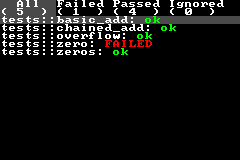9 releases
| 0.3.2 | Apr 18, 2025 |
|---|---|
| 0.3.1 | Dec 31, 2024 |
| 0.2.0 | Dec 24, 2024 |
| 0.1.4 | Oct 9, 2024 |
| 0.1.3 | Jun 17, 2024 |
#81 in Testing
261 downloads per month
Used in 3 crates
99KB
2K
SLoC
gba_test
Testing framework for the Game Boy Advance.

Getting Started
Using gba_test requires a nightly Rust version.
Prerequisites
- ARM Binutils: At minimum, you'll need the ARM GNU linker (
arm-none-eabi-ld) to properly build projects usinggba_test. You can obtain it from the ARM website. - rust-src - GBA development requires
build-stdto work. Runrustup component add rust-srcto enable it. cargoconfiguration - Configuration forcargoshould be provided in acargo/config.tomlfile within your project. An example configuration is as follows:
[build]
target = "thumbv4t-none-eabi"
[target.thumbv4t-none-eabi]
runner = "mgba"
rustflags = ["-Clinker=arm-none-eabi-ld", "-Clink-arg=-Tgba.ld", "-Ztrap-unreachable=no"]
[unstable]
build-std = ["core"]
Adding gba_test to your list of dependencies
In your Cargo.toml manifest, add gba_test to your list of dev-dependencies:
[package]
name = "your_project"
version = "0.1.0"
edition = "2021"
[dev-dependencies]
gba_test = "0.3.2"
Running the test runner
gba_test provides its own test runner. To run the tests, you'll need to call the runner from your main() function.
The following code can be used to call the test runner when you run cargo test:
#![no_std]
#![cfg_attr(test, no_main)]
#![cfg_attr(test, feature(custom_test_frameworks))]
#![cfg_attr(test, test_runner(gba_test::runner))]
#![cfg_attr(test, reexport_test_harness_main = "test_harness")]
#[cfg(test)]
#[no_mangle]
pub fn main() {
test_harness()
}
Calling test_harness() will run all tests defined within your project.
Defining tests
gba_test provides its own custom #[test] attribute for defining tests. It works similar to the default #[test] attribute.
// A very simple function to test.
pub fn add(left: usize, right: usize) -> usize {
left + right
}
#[cfg(test)]
mod tests {
use super::add;
use gba_test::test;
#[test]
fn it_works() {
let result = add(2, 2);
assert_eq!(result, 4);
}
}
Other common testing attributes are also supported, including #[ignore] and #[should_panic].
Running Tests
gba_test can be run on anything that runs .gba files, ranging from original Game Boy Advance hardware to emulators.
Configuring to run on mGBA with cargo test
For development workflows, it is recommended to run tests on an emulator. The example cargo/config.toml provided in the "Prerequisites" section will enable you to run tests on mGBA (assuming mgba is in your PATH) when you run cargo test.
Running on real hardware
To run on real Game Boy Advance hardware, you can flash the generated test binary to a cartridge.
Preparing a .gba file
When running cargo test, a .elf test binary is generated. Emulators like mGBA can run this .elf file, but real hardware requires a .gba file. The location of your test binary is output by cargo test. For example, running cargo test on the gba_test library itself outputs something like:
Running unittests src\lib.rs (target\thumbv4t-none-eabi\debug\deps\gba_test-5b5cf1bdf24b2915)
The path in the parenthesis is the location of the test binary. You can use arm-none-eabi-objcopy (obtained from the ARM website) to create a .gba file from this binary:
arm-none-eabi-objcopy -O binary target\thumbv4t-none-eabi\debug\deps\gba_test-5b5cf1bdf24b2915 test.gba
Next, run gbafix:
cargo install gbafix
gbafix test.gba
Now, test.gba is prepared to run on real Game Boy Advance hardware. See documentation for your flash cart for instructions on flashing the .gba file to the cartridge and running it.
Running using mgba-rom-test
gba_test is configured to be run with the mgba-rom-test binary using SWI call 0x27 with r0 as the output register. The following exit values may be emitted:
0- A successful test run.1- One or more tests failed.2- The tests failed to complete. This indicates that a panic occurred outside of test execution.
To use mgba-rom-test in continuous integration with GitHub Actions, it is recommended to use the github-mgba-rom-test action. See this project's GitHub Actions setup for examples of this workflow.
Dynamic Allocation
gba_test provides a global allocator, allowing it to test code that relies on alloc. To use alloc with the provided global allocator, add it to your cargo configuration:
# ...
[unstable]
build-std = ["core", "alloc"]
Now you can use alloc through an extern crate alloc; in your test file. For example:
#![no_std]
#![cfg_attr(test, no_main)]
#![cfg_attr(test, feature(custom_test_frameworks))]
#![cfg_attr(test, test_runner(gba_test::runner))]
#![cfg_attr(test, reexport_test_harness_main = "test_harness")]
extern crate alloc;
#[cfg(test)]
#[no_mangle]
pub fn main() {
test_harness()
}
The global allocator will allocate dynamic memory in EWRAM. EWRAM is 256KiB, with some of that space also being used to store test results and other state. Be aware that tests which try to allocate more memory than is available will cause test execution to fail. Note also that the allocator provided is a simple bump allocator, so excessive allocations within a single test may consume more memory than is expected.
Testing using custom global allocators is not supported.
Logging
Some emulators, such as mGBA or no$gba, support logging. gba_test provides optional integration with the log crate to log information about test running. You can enable logging through the log feature:
[dev-dependencies]
gba_test = {version = "0.1.4", features = ["log"]}
You can also log within your tests using the log crate:
use gba_test::test;
#[test]
fn foo() {
log::info!("important information");
}
To produce the log output for your emulator, you'll need to use a logger implementation specific for that emulator's logging interface. The following logger implementations are recommended:
- mGBA:
mgba_log - no$gba:
nocash_gba_log
Initialize the logger prior to calling the test runner, like so:
#![no_std]
#![cfg_attr(test, no_main)]
#![cfg_attr(test, feature(custom_test_frameworks))]
#![cfg_attr(test, test_runner(gba_test::runner))]
#![cfg_attr(test, reexport_test_harness_main = "test_harness")]
#[cfg(test)]
#[no_mangle]
pub fn main() {
mgba_log::init();
test_harness()
}
License
This project is licensed under either of
- Apache License, Version 2.0 (LICENSE-APACHE or http://www.apache.org/licenses/LICENSE-2.0)
- MIT license (LICENSE-MIT or http://opensource.org/licenses/MIT)
at your option.
Contribution
Unless you explicitly state otherwise, any contribution intentionally submitted for inclusion in the work by you, as defined in the Apache-2.0 license, shall be dual licensed as above, without any additional terms or conditions.
Dependencies
~115KB